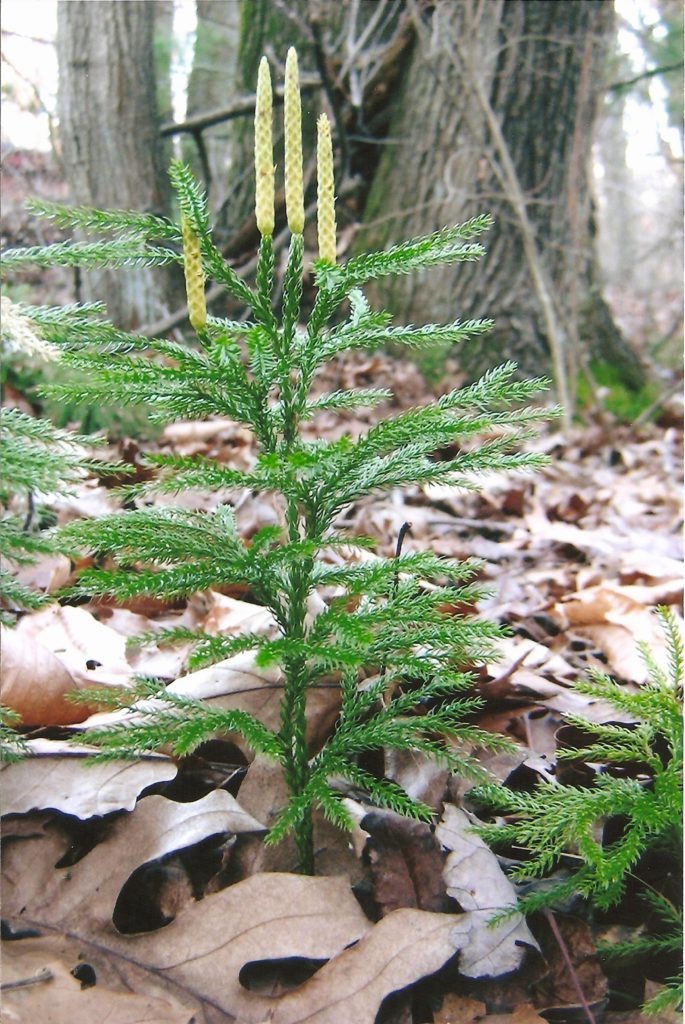Botanist, board member, and defender of the realm Bryan Hamlin presents a wonderful group of plants in the Fells called Lycophytes that “don’t seem to mind the cold and have been around on the planet for about 300 million years!” (All photos taken in the Middlesex Fells Reservation by Bryan Hamlin.)
We are grateful to Bryan for bringing a little bit of “evergreen” into these mid-months of winter. Lycophytes, a hardy clade also known as the ‘fern allies’, are vascular plants similar to ferns but which have unique leaves called microphylls, a type of plantleaf with one single, unbranched leaf vein. They are primitive plants and lack seeds, wood, fruit and flowers. [Sources: Wikipedia and BasicBiology.net.]
Huperzia lucidula in the Middlesex Fells [Courtesy photo dated January 31, 2019 taken by Bryan Hamlin]
Huperzia lucidula in the Middlesex Fells [Courtesy photo dated October 26, 2008 taken by Bryan Hamlin]
Update: January 31, 2019 – “I’m home. Went to an area that’s a bit of the Fells right up the top between a swimming pool and I-93. I’d seen Lycopodia there before and sure enough came across a big patch of dozens of ’em. Here’s a couple of pics. I’m 90% certain these are Lycopodium hickeyi because of the way the little leaflets are around the stem on all sides.” [Note from Bryan Hamlin.]
Lycopodium hickeyi in the Middlesex Fells [Courtesy photo dated November 20, 2006 taken by Bryan Hamlin]
Update: January 30, 2019 – “Did a bit of on-line research and discovered a few fun details about Princess Pines or Club-mosses.” [Note from Bryan Hamlin.]
As fans of the Friends of the Fells Facebook page may have seen, we posted an image with the following caption: “Lycopodium obscurum, commonly called rare club-moss, ground pine, prince’s pine, or princess pine, a North American species of club-moss in the family Lycopodiaceae.”
This began an exciting exchange of correspondence and research with Bryan Hamlin. One of us knew it as club-moss and the other as “Princess Pine” — a rare and delicate species (see “Don’t Pick that Princess Pine” article in the Danbury, CT, News Times.) “Princess pine is a member of the family of club-mosses. Despite their name, they’re not particularly mossy. They have roots, which spread horizontally. Princess pine shoots grow from those roots with several plants sharing one root system. Pick one and you damage them all.”
Bryan Hamlin adds that from an evolutionary perspective, these club-mosses are fascinating for their history and longevity:
“Lycopods are fern-like club-mosses, which reproduce either via gametes in an underground sexual phase, or in an alternating life cycle via spores. These fascinating organisms have been identified as remnants of prehistoric ferns, with early fossils dating back as far as 300 million years (late Silurian to early Devonian period). The spore-bearing bodies, known as strobili, appear as club-shaped growths at the tips of the moss like branches, hence the name club-mosses.”
[Source: ScienceDirect.com, accessed January 31, 2019.]
Update: January 29, 2019 – This photo from yesterday shows the strobili fairly clearly. [Courtesy photo: Bryan Hamlin]
Lycopodium hickeyi in the Middlesex Fells [Courtesy photo taken by Bryan Hamlin]
So, although these are ancient, beautiful plants, they are also delicate and need to be cared for and preserved. Never, ever pick them, but please share your photos with us either via our Facebook page or email them to us at friends@fells.org. Thank you for caring about the loveliest of the club-mosses, the ones in the Middlesex Fells Reservation!




